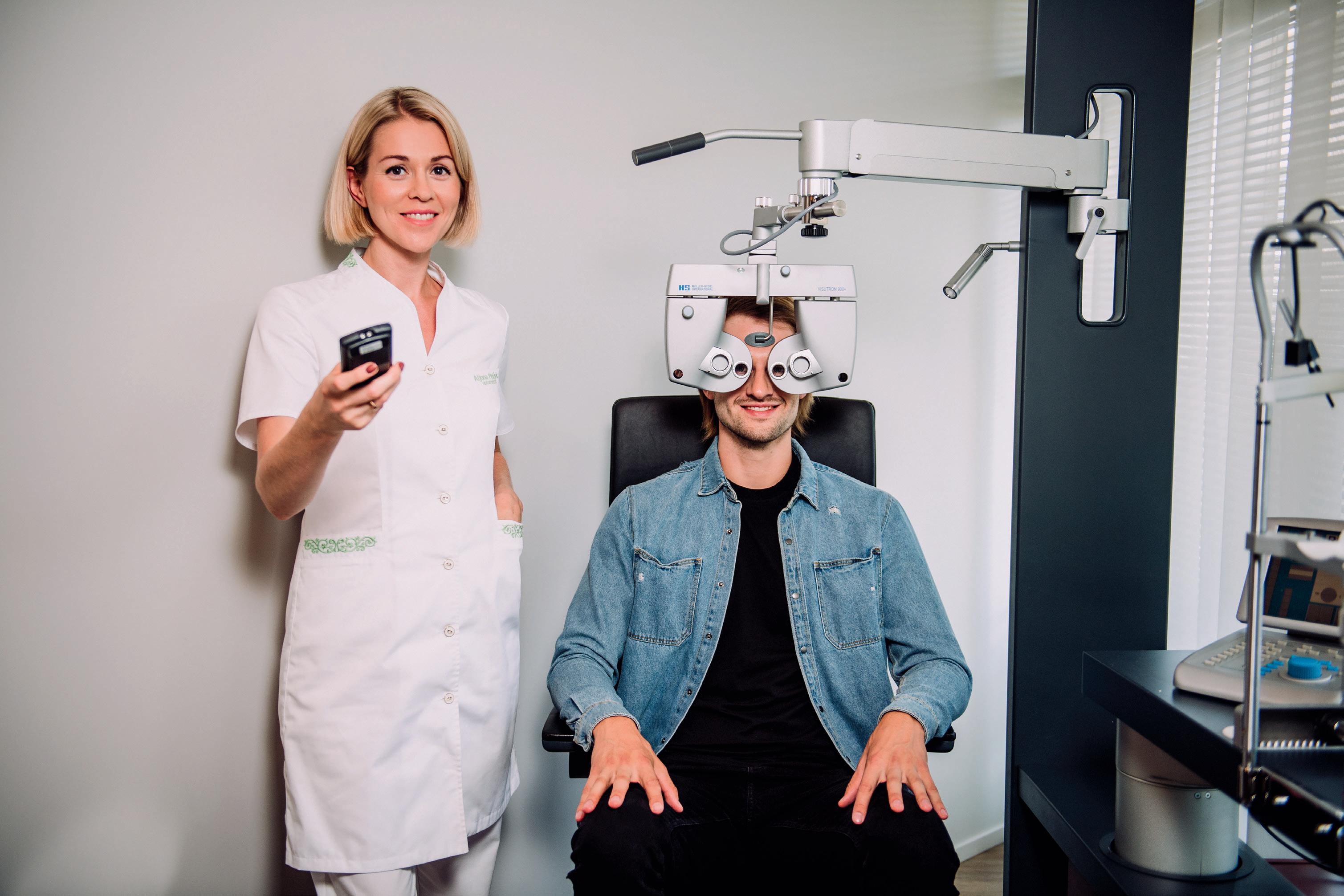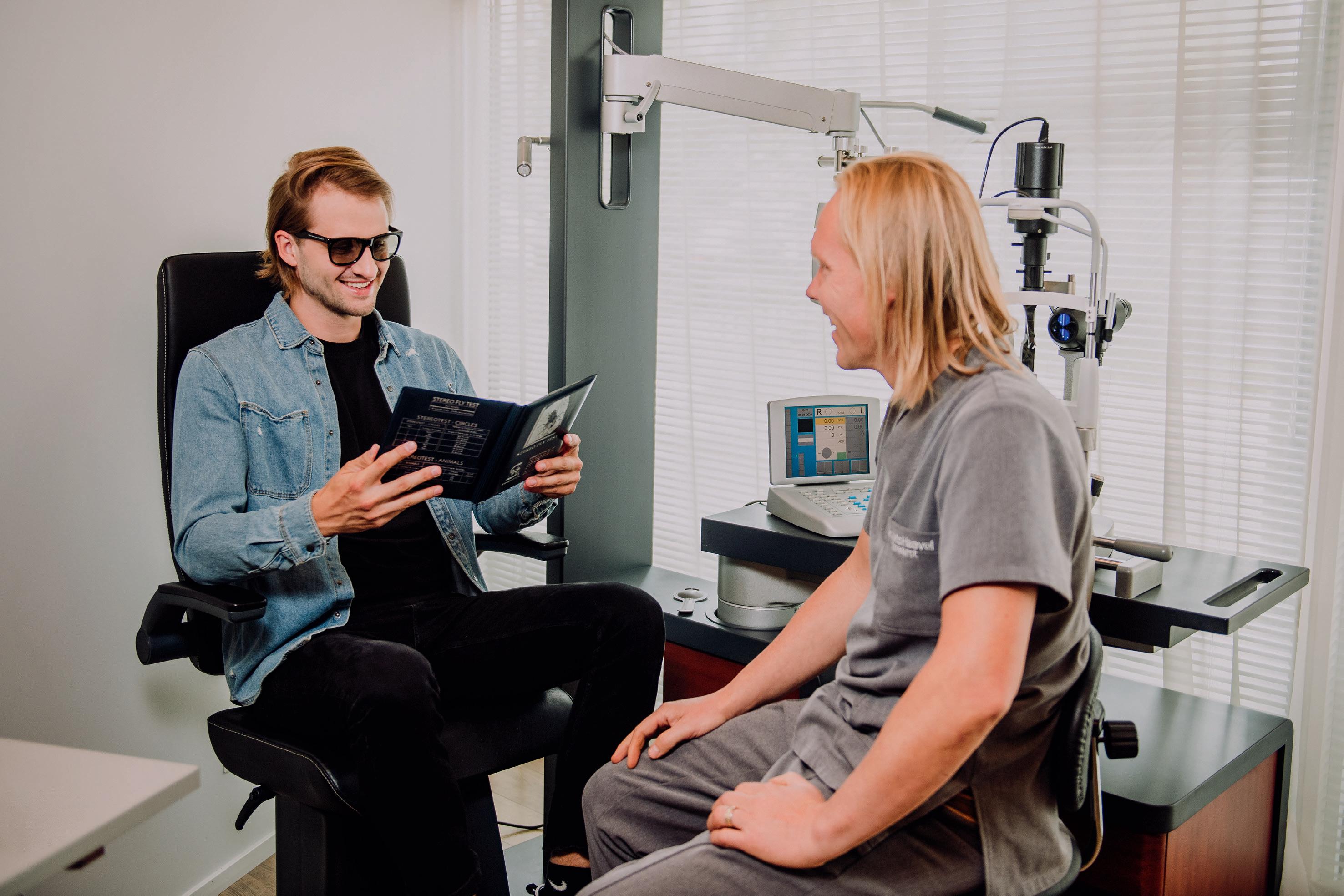
4 minute read
Informed consent
The Vision Clinic staff and the surgeon are always there for you to help you find answers to your questions – do not be afraid to ask.
Firstly, a laser procedure requires a precise medical diagnosis, and secondly, your informed consent. Before you consent to the procedure, we will provide you with a thorough overview of the details thereof.
Advertisement
Giving your consent is a multi-stage process, which includes the patient, an optometrist, an ophthalmologist and the clinic staff. The staff are there to help you receive answers to your questions – do not be afraid to ask!
Information Process
Our customer service representative provides you with a booklet containing information on the cost and possible risks of the procedure and a patient personal data sheet during the eye examination. Please make sure to read the KSA Vision Clinic’s patient information booklet. The procedure assistant or an optometrist will answer any questions you may have and reviews the personal data sheet with you.
Our optometrist conducts thorough eye examinations before the procedure in order to determine whether you meet the eligibility criteria. They explain the nature of the procedure, possible risks and expected benefits, talk about other methods of improving your vision and describe special circumstances that may affect your decision to agree to the procedure.
Our eye surgeon assists you in giving an informed consent. Before the procedure you will meet our eye surgeon who will describe the course and the steps of the procedure. They also stress the most important recommendations that you need to follow immediately aſter the procedure and the following week. The procedure assistant provides you with patient information, which includes the activity plan for the post-procedure period.
If you have any unanswered questions or if you do not understand something, ask your eye surgeon. The eye surgeon does not need to explain to you generally known or rare dangers or risks they are not aware of at the time, even if the existence of these is determined later. However, the surgeon must inform you of the procedure to a degree sufficient for you to make a decision to go through with or refuse the procedure.
Once you have read this booklet, consulted the optometrist and the surgeon and decide to undergo the procedure, you will be issued a patient personal data sheet for signing. By signing this, you confirm that you have been informed of the nature of the procedure, its risks, benefits and alternative possibilities, consent to the procedure and that the decision to undergo the procedure constitutes an informed consent.
Service Fee
KSA Vision Clinic applies the same combined fee to both surgical and post-procedure services. This includes the medicines and services required before and aſter the laser procedure, including free follow-ups for 3 years aſter the procedure. Your task is to ensure that the service fee is paid by the day of the procedure. You can pay for the service with a credit or a debit card, by a bank transfer or in cash.
We also offer instalment plans in cooperation with banks, which allow you to pay for the procedure in instalments. If you decide to use an instalment plan or a loan to pay for the laser procedure, please contact our staff in order to obtain more information. KSA customer service specialists will guide you upon applying for an instalment plan. You can also acquaint yourself with KSA’s cooperation partners or submit an application for using an instalment plan independently on the KSA Vision Clinic’s website at www.ksa.ee.
STAFF’S ROLE
Eye surgeons (ophthalmologists), medical nurses and optometrists are trained healthcare professionals, who have extensive experience in refractive surgery-related pre-, periand post-procedural treatment.
The eye surgeon oversees the course of your recovery either directly or with the help of assistants for five to seven days aſter the procedure until the protective contact lenses are removed from the cornea.
The surgeon has a higher education in medicine and extensive experience in both medical and surgical treatment of refractive errors and eye diseases. In addition to graduating from the University of Tartu Faculty of Medicine, the surgeon of KSA Vision Clinic has also completed a three-year residency in the field of eye diseases and additional certified training in refractive surgery, excimer laser technology and microkeratome all over the world.
Our optometrists have completed the 3.5-year optometry training at Tallinn Health Care College and have a Bachelor’s degree in ophthalmic optics. KSA Vision Clinic optometrists are specialists in non-surgical diagnosis and the treatment of refractive errors and have extensive experience in post-procedural treatment of refractive surgery patients. The optometrist will resume monitoring you 5-7 days aſter the procedure.
Repeat Procedures
Our goal is to use a high-tech laser procedure to offer you a life free from glasses or contact lenses, but sometimes this may require a repeat procedure.
In general, we are able to achieve excellent quality of vision with one laser procedure, but some patients may require additional procedures due to the extent of their refractive error and physiological characteristics.
Repeat procedures are normal in refractive surgery, but their likeliness in KSA Vision Clinic is 1-2 %. The greater or more complex a refractive error is, the greater the possibility that you need to repeat the procedure. If you are likely to require a repeat procedure, your optometrist and eye surgeon will inform you of this already aſter the initial eye examination. Certain refractive errors are only corrected with a multistage procedure.
In general, patients have to wait at least six months to undergo a repeat procedure. During this period, the result of the first procedure will stabilise completely. The final decision regarding a repeat procedure is made by the eye surgeon, who will consider factors such as the condition and amount of the corneal tissue, the type of astigmatism and other eye parameters. They will decide on whether or not a repeat procedure is possible and necessary on the basis of these data.
The second Flow procedure and recovery are similar to the first one. You do not have to pay extra for a repeat procedure or the second stage of the procedure.
Regardless of whether or not you require a repeat procedure, you must still remember that all patients may one day require reading glasses due to the natural aging of the eye.









